Integrated service delivery for individuals with fetal alcohol spectrum disorder – Integrated service delivery (ISD) refers to person-centred coordination and linkage of health, social, and/or community services to meet client needs. ISD models are particularly useful for enhancing continuity of care, optimising use of resources, and increasing service efficacy for populations with complex and dynamic needs, including those with disabilities. Individuals with disabilities and their families experience diverse needs that often necessitate supports from a wide range of systems. ISD presents a potential model for enhancing these needed supports and has been applied with people with a range of complex needs and disabilities, including those with developmental disorders, mental health challenges, chronic diseases, as well as cognitive impairment, and dementia. For these groups, ISD models can help bridge systems of care and enhance outcomes by meeting individual and family needs more effectively, increasing client satisfaction and empowerment, and improving health and quality of life.
Hands, not Hurdles: Helping Children with FASD and their Families – Fetal alcohol spectrum disorder (FASD) is one of the most common neurodevelopmental disabilities in the Western world and yet it remains a highly misunderstood, multi-faceted brain and body disability that affects many people in our communities. This lack of understanding about the complexities of FASD leads to blaming, shaming, stigma, discrimination and racism that causes harm to people with FASD and their families. It also leads to people with FASD getting almost no supports or services. We all need to be more informed, understanding and supportive of children and youth with FASD and their families. This short, illustrated report follows RCY’s more detailed report Excluded, Increasing Understanding, Support and Inclusion for Children with FASD and their Families, released in April 2021.
Responding to the Unique Complexities of Fetal Alcohol Spectrum Disorder — Fetal alcohol spectrum disorder (FASD) is a multifaceted disability, characterized not only by brain- and body-based challenges, but also high rates of environmental adversity, lifelong difficulties with daily living, and distinct sociocultural considerations. FASD is one of the most common neurodevelopmental disabilities in the Western world and associated with significant social and economic costs. It is important to understand the complexities of FASD and the ways in which FASD requires unique consideration in research, practice, and policy. In this article, we discuss our perspectives on factors that distinguish FASD from other disabilities in terms of complexity, co-occurrence, and magnitude. We provide an overview of select literature related to FASD as a socially rooted disability with intergenerational impacts and multiple layers of stigma. These social issues are intertwined with notable experiences of adversity across the lifespan and high rates of co-occurring health concerns for individuals with FASD, all of which present unique challenges for individuals, caregivers, families, service providers, and policy makers. Understanding these factors is the first step in developing and implementing specialized initiatives in support of positive outcomes for individuals with FASD and their families. Future directions are proposed for advancing research, practice, and policy, and responding to the unique complexities of FASD.
Difficulties in Daily Living Experienced by Adolescents, Transition-Aged Youth, and Adults With Fetal Alcohol Spectrum Disorder — Individuals with fetal alcohol spectrum disorder (FASD) experience a range of problems in their cognitive, affective, and physical functioning following prenatal alcohol exposure (PAE), in addition to multiple complex difficulties in daily living that impact well-being. Using the Canadian National FASD Database, we sought to profile a range of difficulties in daily living, along with risk factors, in a large cross-sectional cohort of adolescents, transition-aged youth, and adults with PAE, of which a subset was ultimately diagnosed with FASD.
Integrated Service Delivery in Fetal Alcohol Spectrum Disorder (FASD): A Review of the Alberta FASD Service Network Model — The Alberta FASD Service Network model is a unique integrated FASD service delivery approach established in 2007 which facilitates the delivery of coordinated FASD supports and programs across Alberta. This study reviews the evidence pertaining to this model.
SUAP Environmental Scan — This environmental scan was conducted to build a list of substance use treatment programs across Canada for the purpose of identifying programs as part of a research study investigating substance use treatment for individuals with FASD.
Framing Fetal Alcohol Spectrum Disorder Policy, Practice, and Research Using the United Nations Convention on the Rights of Persons with Disabilities — The purpose of this report is to identify how the United Nations Convention on the Rights of Persons with Disabilities (CRPD) can be used to improve service provision and government policies for persons with Fetal Alcohol Spectrum Disorder (FASD). It includes recommendations for how the CRPD could be used to advocate for improved outcomes and as a framework for future research, policy, and practice.
An Integrative Systems Approach to Enhancing Service Delivery for Individuals with Complex Needs — There are a lack of system-wide integrative services for individuals with complex needs and a corresponding demand for advancing cross-disciplinary practices in community settings. This demand is especially acute for individuals with fetal alcohol spectrum disorder (FASD) and a gap we have sought to address.
The FASD Patient Journey — In September 2018, the Alberta FASD Cross Ministry Committee initiated an FASD Patient Journey Project to examine the current state of FASD services and supports from the perspective of persons with FASD, their caregivers and their service providers. After 120 interviews in 34 communities across Alberta, the project team has captured not only their perspectives on service delivery but their frustrations, ideas, hopes and dreams as well.
The National Fetal Alcohol Spectrum Disorder (FASD) Strategic Action Plan 2018-2028 — This plan has been developed to provide a clear pathway of priorities and opportunities to improve the prevention, diagnosis, support and management of FASD in Australia. It builds on the signi cant foundational work and investment over recent years made by governments, non-government organisations, family advocates, researchers and clinicians, individual champions and communities who have raised awareness and supported individuals and their families living with FASD.
The Marulu Strategy 2008–2012: overcoming Fetal Alcohol Spectrum Disorder (FASD) in the Fitzroy Valley — Aboriginal leaders concerned about high rates of FASD in the Fitzroy Valley, remote north-western Australia, introduced restrictions on access to take-away full-strength alcohol. Following this, Aboriginal leaders engaged strategic partners in a broader strategy to address FASD in the region. The aim of this study was to develop and implement a community-led, researcher-supported, FASD strategy.
Putting Fetal Alcohol Spectrum Disorder (FASD) on the Map in New Zealand: A Review of Health, Social, Political, Justice and Cultural Developments — In this article, the developments within New Zealand’s health, justice, social and cultural sectors are traced and the work of many individual trailblazers who have put FASD on the map is acknowledged.
Best Practices for Serving Individuals with Complex Needs – Guide and Evaluation Toolkit — This document is intended to provide guidance for individuals and agencies working with clients with a Fetal Alcohol Spectrum Disorder (FASD) and their families. Together as a single source, a best practice guide and evaluation tool kit are provided for use by agencies and their staff. There are two anticipated uses for this resource: 1) to assess current service delivery by providing indicators and outcomes that can be measured to inform practice improvements; and 2) to inform future service offerings by supplying a framework on which to develop policy and practices.
Intervention Across the Lifespan: Where are we at and where do we need to go? — This paper identifies the existing gaps in research and provides an overview of the key needs at different developmental stages within the lifespan of an individual with FASD.
Accessible Canada—Creating new national accessibility legislation—In 2016, Minister Carla Qualtrough launched the website Accessible Canada, where Canadians were asked to think about what accessibility means to them and what it could mean for their communities. Between June 2016 and February 2017, over 6,000 Canadians and over 90 organizations shared their ideas about an accessible Canada, culminating in this report.
FASD in the Early Years Webinar — In this Canadian Child Care Federation webinar recording, participants will gain an introduction to FASD, including its core characteristics, the importance of early identification, and the benefits of developing an FASD-informed workforce. Presented by Kathy Unsworth, the session provides valuable insights from a new CanFASD training course designed to support frontline program workers in improving outcomes for children and families.
Issue Papers
Gap Analysis: Human Trafficking and Fetal Alcohol Spectrum Disorder — The purpose of this gap analysis is to describe what is known about human trafficking and FASD, identify complexities unique to FASD that can increase vulnerability to trafficking, and to provide research, policy, and practice recommendations.
CanFASD Issue Paper: Strengths Among Individuals with FASD — The vast majority of FASD research is focused on the challenges and impairments associated with the disability, as well as the burden of FASD on families and the broader community. This type of research can help to validate the experiences of individuals with FASD and their families, and to inform where services and supports might be needed the most. However, the simultaneous lack of strengths-based studies can perpetuate a sense of shame, suffering, and victimization, and contribute to the stigma already associated with FASD. By neglecting to explore the successes of individuals with FASD, we fail to recognize their immense potential and celebrate the unique contributions that each individual has to offer. The goal of the current issue paper was to review the existing strengths-based FASD literature and highlight the need for more studies to fill this critical gap.
Computer Game Interventions for Individuals with FASD — Fetal Alcohol Spectrum Disorder (FASD) is an umbrella term used to describe the range of disabilities and diagnoses that can result from prenatal exposure to alcohol. Intervention and treatment options for individuals with FASD are both costly and resource-intensive because they are tailored to the client. Computer game interventions present a novel approach to interventions that may help mitigate the effects of brain injury associated with FASD.
The Impact of Jordan’s Principle on Children with FASD — Jordan’s Principle is a child-first principle meant to prevent First Nations children from being deprived of essential public services or experiencing delays in receiving them.
Nutritional Supplementation and FASD — Fetal Alcohol Spectrum Disorder (FASD) is an umbrella term used to describe the range of disabilities and diagnoses that can result from prenatal exposure to alcohol. Maternal nutrition can often be compromised when alcohol is consumed, especially in situations of chronic alcoholism. Poor overall nutrition may contribute to and/or compound the effects of prenatal alcohol exposure. Recent evidence from preclinical studies suggests that pre- or postnatal nutritional supplementation may improve neurocognitive function (e.g., learning, memory) and behaviour. Thus nutritional supplementation may be an accessible method for improving maternal and fetal pre- and postnatal health.
Teacher‑Reported Prevalence of FASD in Kindergarten in Canada: Association with Child Development and Problems at Home — The prevalence of Fetal Alcohol Spectrum Disorder (FASD) may be underestimated as it can be difficult to diagnose in early childhood possibly reflecting unique developmental trajectories relative to other Neurodevelopmental Disabilities (NDDs). Using data collected via the Early Development Instrument (EDI) between 2010 and 2015, we examined the prevalence of kindergarten children with FASD and their concurrent developmental outcomes. We found that the prevalence of FASD ranged from 0.01 to 0.31%. A greater percentage of children with FASD had teacher-reported home problems that interfered with their classroom functioning. Overall children with FASD had higher mean scores on the developmental domains compared to children with NDDs. Results of the current study can inform strategies and policies for early identification and
intervention.
Understanding Adverse Experiences and Providing School-Based Supports for Youth who are High Risk with and without FASD — Youth who are high risk (YHR) face numerous adversities, and those with Fetal Alcohol Spectrum Disorder (FASD) may experience even more complex challenges due to the compounding impact of brain dysfunction. However, very little research has been conducted to understand or characterize this vulnerable group, or explore potential strategies for supporting their specific needs. In the current study, we sought to characterize some of the adverse experiences of YHR with and without FASD (N = 90) who were attending an innovative school that supports students who have struggled in other educational settings. We also examined services offered at this school and explored whether service access and several social and educational factors differ between youth with and without FASD. Findings indicate that YHR with FASD have more complex needs and a different pattern of service use than YHR without FASD. These findings are discussed in the context of how we might better support YHR and foster successful outcomes.
FASD Treatment Improvement Protocol (TIP) — The Canada FASD Research Network (CanFASD) Research Network received support from the Government of Alberta through the FASD-Cross Ministry Committee to develop a Treatment Improvement Protocol (TIP) for FASD based on Canadian research and practice and to pilot the TIP in Alberta. The goal of the TIP was to identify those at risk for having FASD, or having a child with FASD, from substance abuse and mental health centres, with the ultimate goal of improving outcomes through education, screening and better matched interventions. The online training program for TIP is available at https://estore.canfasd.ca/towards-improved-practice
Assessment for Intervention of Children with Fetal Alcohol Spectrum Disorders: Perspectives of Classroom Teachers, Administrators, Caregivers, and Allied Professionals — This study increases the links between research and practice as we move toward a model of assessment for intervention. Such a model has a strong potential for optimizing assessment practices to better meet the needs of children with FASDs as it promotes a shift that focuses on successful child outcomes regardless of diagnosis.
Neuropsychological Aspects of Prevention and Intervention for FASD in Canada – Pei, J., Tremblay, M., McNeil, A., Poole, N., McFarlane, A. (2016). Journal of Pediatric Neuropsychology. doi:10.1007/s40817-016-0020-1
Issue Papers
Current Strategies and Educational Supports for Students with FASD — Evidence shows the need for revised strategies and improved educational supports for students with FASD through all levels of diagnosis, assessment, and intervention planning if positive learning outcomes are desired.
Infographics
Guide for Employment Professionals: Supporting Employment in Adults with Fetal Alcohol Spectrum Disorder — This document is intended to provide guidance for individuals and agencies working with clients with Fetal Alcohol Spectrum Disorder (FASD). It is for use by employment professionals to guide their work as they assist clients in preparing for, obtaining, and maintaining employment. This document is based on current literature, interviews, as well as survey data from people with FASD and their caregivers and support workers.
An Enhanced Employment Guide for Employment Professionals — This report presents findings from a project focused on successful employment for individuals with Fetal Alcohol Spectrum Disorder (FASD)
FASD & Employment Report, April 2016 — This report was prepared by CanFASD to identify current employment programs and model frameworks that are currently used to support adults with FASD.
Issue Papers
Employment and FASD: Strategies for Success — Fetal Alcohol Spectrum Disorder (FASD) is the most common type of developmental disability in North America. Although a large majority of individuals with FASD do not have any visible signs of their disability, they all have some kind of permanent brain injury that impacts their daily life; in particular, the ability to find meaningful employment.
Co-Creating Housing Solutions (CHOoSE)
Co-creating Housing Solutions (CHOoSE) is a research initiative to enact housing solutions for individuals with fetal alcohol spectrum disorder (FASD). Visit the project website to view findings and publications.
Resources and Reports
A Mosaic of Options: A Housing Continuum for People with FASD — This report will summarise each presentation and bring out the key themes that were present throughout the two day FASD & Housing Symposium: “A Mosaic of Options: A Housing Continuum for People with FASD” held in Whitehorse, Yukon on March 3-4th, 2020.
Creating Intersections: A systematic and person-centred harmonizing framework for housing individuals with FASD — This project marks the first step of many in the implementation and maintenance of meaningful housing service delivery and supports to better understand how to meet the needs of individuals with FASD. Our hope for the framework described in this document is twofold. First, that it empowers service providers in their efforts to support individuals in meaningful ways, and second, that it reflects the voices of individuals struggling to be housed. We hope that through the use of this framework we can begin to recognize current practices, celebrate successes, and adapt programming to better meet the needs of individuals with FASD.
Feasibility Study in Housing for People with FASD — Since 2002, over 25 organizations have been networking in Regina to improve services to people with Fetal Alcohol Spectrum Disorder (FASD) and their caregivers. Recognizing the need to explore housing, three of those organizations (The Saskatchewan FAS Network, The Regina FASD Community Network and the Regina Community Clinic) partnered to apply for funding from the National Homelessness Initiative (NHI). This feasibility study was the outcome of that funding.
Housing Literature Review—Literature review and best practices for the housing and supports framework; housing and supports initiative; and creating connections: Alberta’s addiction and mental health strategy.
The Addiction and Mental Health Tertiary Care Framework: Models of Evidence Based/Informed Rehabilitation (Models of Care) — Mental health redesign has taken place in many jurisdictions, notably Italy, UK, US, Australia and Canada. The Canadian experience is described in this report.
Addiction and Mental Health Housing and Supports Framework—Creating Connections: Alberta’s Addiction and Mental Health Strategy
Understanding mothers experiencing homelessness: A gendered approach to finding solutions for family homelessness — This report examines social experiences for mothers and children who are experiencing homelessness in two shelters and one housing program in Calgary, Alberta. Currently, much of the research on homelessness and what works for supporting individuals into sustainable housing comes from research on the single, adult, male population. This study provides evidence to better understand how families become homeless, and the experiences of mothers and children as they move within various public systems while dealing with a history of violence, trauma, and poverty.
Issue Papers
A Place to Call Home: Addressing Housing Needs for Individuals with Fetal Alcohol Spectrum Disorder — The purpose of this paper is to provide a review of the existing literature on housing for people with FASD and recommendations for policymakers and service providers for implementing FASD-informed approaches to effectively address housing needs.
Sex Work and Motherhood: Social and Structural Barriers to Health and Social Services for Pregnant and Parenting Street and Off-Street Sex Workers
Stigma, Discrimination and FASD — The stigma associated with problematic alcohol use, particularly among pregnant women, presents a significant barrier to accessing medical treatment, services and supports. Individuals affected by Fetal Alcohol Spectrum Disorder (FASD), as well as their families and caregivers, can also experience stigma.
Common Messaging Guide—The purpose of this document is to assist those writing and talking about people with FASD or the issues related to the disability to use the same statistics, framing of topics, and language.
Language Guide—This guide is intended to provide alternative words or phrases for those commonly found in news media and other public communications. We propose these be used in an effort to promote the dignity of those living with FASD and their families.
Issue Papers
Gap Analysis: Black Identity and Fetal Alcohol Spectrum Disorder — The impact of health disparities within the Black community has been outlined in several disease processes, resulting in poorer health outcomes such as increased morbidity and mortality. However, little is known about the intersectionality of being Black with a diagnosis (or possible diagnosis) of FASD, especially within Canada. Increased research initiatives focused on identifying the prevalence and experience of FASD within the Black community, as well as culturally aware supports and resources, are required.
Gap Analysis: Sexual Orientation, Gender Identity, Gender Expression, and Fetal Alcohol Spectrum Disorder — There has been an increase in the awareness of disabled people who identify with a diverse sexual and/or gender identity. Although this area has been minimally explored within the context of FASD, this issue is frequently broached by caregivers and service providers as an area of increased need and support. FASD is complex, and the combination of diverse gender identities and sexual orientations with FASD can increase the vulnerability of people with FASD. Therefore, approaches to care and service provision should identify and dismantle heteronormative and binary structures to reframe inclusivity. Absent societal perceptions of these intersecting identities raise human rights and equity concerns as many people with diverse gender and sexual identities experience stigmatization, discrimination, unmet health needs, and suicidality. Thus, an intersectional and human rights-based lens must be applied in research, policy, and practice to aid social transformation toward an inclusive society, including for persons with FASD.
Neurodiversity and FASD — The concept of neurodiversity is a relatively new phenomenon that represents the wide variety of differences among humanity. Although neurodiversity has been discussed in relation to other disabilities, increased attention is needed to better understand and consider how FASD can be part of neurodiversity. This issue paper describes the concept of neurodiversity, identifies some of the ways neurodiversity is discussed in the literature, and presents recommendations for considering FASD and neurodiversity.
Mothers’ Experiences of Stigma: Multi-Level Ideas for Action — Women who use substances in pregnancy and/or have children with Fetal Alcohol Spectrum Disorder (FASD) are highly stigmatized by the media, public, and health and social service providers. Social isolation, non-disclosure of alcohol and/or substance use, and not seeking or receiving the necessary support can be the result.
Individuals with Fetal Alcohol Spectrum Disorder and Experiences of Stigma — The purpose of this issue paper is to explore the ways in which individuals with FASD experience stigma, identify the implications of stigma on individuals and their families, and provide recommendations to reduce stigma.
Policy Action Paper: Toward a Standard Definition of Fetal Alcohol Spectrum Disorder in Canada — This policy action paper describes the approach taken to create a standard definition of FASD, as well as our proposed definition for use in FASD policy and practice.
Strengths Among Individuals with FASD — The vast majority of FASD research is focused on the challenges and impairments associated with the disability, as well as the burden of FASD on families and the broader community. This type of research can help to validate the experiences of individuals with FASD and their families, and to inform where services and supports might be needed the most. However, the simultaneous lack of strengths-based studies can perpetuate a sense of shame, suffering, and victimization, and contribute to the stigma already associated with FASD. By neglecting to explore the successes of individuals with FASD, we fail to recognize their immense potential and celebrate the unique contributions that each individual has to offer. The goal of the current issue paper was to review the existing strengths-based FASD literature and highlight the need for more studies to fill this critical gap.
Mental Health Resource and Practice Guide – In collaboration with the Canada Northwest FASD Partnership, CanFASD has developed this resource and practice guide for frontline mental health counsellors/therapists, prevention mentors, crisis workers, community mental health providers and those who work directly with individuals with Fetal Alcohol Spectrum Disorder (FASD).
-
- Introduction
- Section 1: Introduction to Fetal Alcohol Spectrum Disorder
- Section 2: Understanding FASD
- Section 3: Addressing our Biases
- Section 4: Mental Health and FASD
- Section 5: Diagnosis and Assessment of FASD
- Section 6: Substance Use and FASD
- Section 7: Trauma-Informed, Strengths-Based, and Culturally Safe Approaches
- Section 8: FASD Prevention
- Conclusion & Additional Resources
Stakeholder Perspectives on Risk factors and Opportunities for Suicide prevention among individuals with FASD [Executive Summary | Lay Summary] — Mental health concerns for individuals with FASD can contribute to a risk for suicide in this population. Few studies address this topic of FASD and suicide in the literature. Mela (2021) identified the concern that suicide risk is higher for those with prenatal alcohol exposure (PAE) due to experiencing higher rates of adverse childhood experiences (ACES), and highlights the need exists for FASD informed interventions. This research was underpinned by the Alberta Youth Suicide Intervention Strategy – Building Strength, Inspiring Hope Report (2019) – a plan for youth suicide prevention. Individuals living with FASD, a lifelong disabling condition experience higher risk of suicide than the general population.
Addiction and Mental Health Care: Resources to Support Collaboration — The Canadian Centre on Substance Abuse (CCSA), the Mental Health Commission of Canada and the Canadian Executive Council on Addictions have collected a list of examples and resources to support collaboration between addictions and mental health systems and service delivery in Canada.
The Implementation of the 2012 Mental Health Strategy for Canada Through the Lens of FASD — Abstract: It is the current authors’ perspective that the successful implementation of Changing Directions, Changing Lives, which seeks to improve mental health and well-being in Canada, cannot be realized effectively without considering FASD. Given that 94% of individuals with FASD also have mental disorders, practitioners in the mental health system are encountering these individuals every day. Most mental health professionals have not been trained to identify or diagnose FASD, and therefore it goes largely “unseen,” and individual treatment plans lack efficacy. Implementation of FASD-informed recommendations, such as those of the Truth and Reconciliation Commission of Canada (2015), can provide a more effective approach to mental health services and improve mental health outcomes.
Fetal alcohol spectrum disorder (FASD): A beginner’s guide for mental health professionals — FASD can feature a diverse range of impairments in cognitive, social, and adaptive functioning. These impairments are often accompanied by co-occurring mental illness, behavioral disorders, substance use, traumatic brain injuries, and developmental disabilities. The presence of these co-occurring conditions creates significant challenges for mental health professionals in terms of screening, assessment, differential diagnosis, and treatment. The key to maximizing the effectiveness of care for clients requires treating each individual’s unique risks and needs in an integrated service delivery framework. Unfortunately, there is typically a lack of expertise in FASD among mental health professionals, which can only be resolved by the increased availability of advanced education and training programs on FASD. To increase awareness of these needs and FASD in general, this article provides general information on the definition and symptoms of FASD, the screening and assessment of FASD, adaptive functioning and memory-related considerations of FASD, and the treatment of FASD.
Toward Quality Mental Health Services in Canada: A Comparison of Performance Indicators Across 5 Provinces — In 2015, the Graham Boeckh Foundation (GBF), in collaboration with the Canadian Alliance on Mental Illness and Mental Health (CAMIMH), initiated a project to test the feasibility of creating and reporting on a small number of mental health and addictions services performance indicators that could be compared across provinces. A team of mental health and addictions scientists from ve provinces (British Columbia, Alberta, Manitoba, Ontario and Québec) developed and generated the measures, where possible for ages 10 years and up, using data already available from the healthcare systems. This is the Summary Report. A full Technical Report is available at https://www.sfu.ca/carmha/publications/prov_indic_2017.html
Caregiver Needs and Stress in Caring for Individuals with Fetal Alcohol Spectrum Disorder: Lay Summary — Individuals with Fetal Alcohol Spectrum Disorder (FASD) often present with a large range of strengths of difficulties making it difficult to identify capabilities and set goals with them. In addition, the areas of difficulty described in this population are often related to adverse outcomes such as delinquency and school conflict. This can have a significant impact on caregivers, contributing to high levels of stress in the caregiver role. However, there is little research on the needs of caregivers supporting individuals with FASD and associations with caregiver stress. Thus, in the current study we examined: 1) the needs of those caring for individuals with FASD, 2) whether their needs are met, and 3) whether caregiver stress is associated with these needs and other caregiver/child characteristics.
Addiction and Mental Health Care: Resources to Support Collaboration — The Canadian Centre on Substance Abuse (CCSA), the Mental Health Commission of Canada and the Canadian Executive Council on Addictions have collected a list of examples and resources to support collaboration between addictions and mental health systems and service delivery in Canada.
Issue Papers
Broad Approaches to Psychotherapy for Individuals with FASD — Many individuals with fetal alcohol spectrum disorder (FASD) experience challenges with their emotional wellbeing and mental health. Despite the significant need for supports, there is very little evidence on the use of psychotherapy with individuals with FASD. In this issue paper, we review the literature on psychotherapy broadly, and summarize the preliminary scientific and clinical anecdotal evidence to identify approaches and potential adaptations that may be used in psychotherapy to best support mental health and wellbeing for people with FASD.
FASD, Stress and Mental Health — Fetal Alcohol Spectrum Disorder (FASD) is a neurodevelopmental disorder resulting from prenatal alcohol exposure (PAE). Individuals with FASD can experience complex behavioural and intellectual problems that persist throughout the lifespan, and can become increasingly complicated, even when supported. Over the last few decades, further research has begun to reveal a close relationship among PAE, stress pathways and mental health.
Infographics
Issue papers
Marijuana Use During Pregnancy and Breastfeeding: Implications for Neonatal and Childhood Outcomes — Marijuana is one of the most widely used substances during pregnancy in the United States. Emerging data on the ability of cannabinoids to cross the placenta and affect the development of the fetus raise concerns about both pregnancy outcomes and long-term consequences for the infant or child. Social media is used to tout the use of marijuana for severe nausea associated with pregnancy. Concerns have also been raised about marijuana use by breastfeeding mothers. With this clinical report, we provide data on the current rates of marijuana use among pregnant and lactating women, discuss what is known about the effects of marijuana on fetal development and later neurodevelopmental and behavioral outcomes, and address implications for education and policy.
Cannabis Use During Pregnancy — In 2018, the Canadian government introduced legislation allowed adults to legally possess and use cannabis. This paper explores what is known about the effects of cannabis use during pregnancy.
Vers des soins informés sur le TSAF – Dans le traitement des troubles liés à l’usage de substances – Version 2 : adultes & jeunes — Travailler avec des personnes atteintes de TSAF dans le traitement des troubles liés à l’usage de substances. Ce guide est une extension de la première version fondamentale qui décrit les pratiques actuelles visant à soutenir les personnes atteintes Troubles causés par l’alcoolisation fœtale (TSAF) qui suivent un traitement des troubles liés à l’usage de substances. Dans cette version, nous fournissons 1) des informations mises à jour et nouvelles concernant la pratique éclairée sur le TSAF, et 2) un accent supplémentaire sur les considérations de développement pour les jeunes atteints de TSAF.
Moving Towards FASD-Informed Care In Substance Use Treatment, Version 2: Adults & Youth — This guide is an expansion of the foundational first version which outlines current practices to support individuals with Fetal Alcohol Spectrum Disorder (FASD) who are in treatment for substance use. In this version, we provide, 1) updated and new information regarding FASD informed practice, and 2) an added focus on developmental considerations for youth with FASD.
Moving Towards FASD-Informed Care In Substance Use Treatment — This guide outlines current practices to support individuals with Fetal Alcohol Spectrum Disorder (FASD) who are in treatment for substance use. In this guide we provide consolidated and expanded knowledge regarding appropriate substance use treatment approaches for individuals with FASD. We adopt the perspective that individuals with FASD can benefit from treatment support that is well-suited to their unique neurodevelopmental needs.
Vers des soins informés sur le TSAF dans le traitement de la consommation de substances — Ce guide décrit les pratiques actuelles pour soutenir les personnes atteintes du Trouble du spectre de l’alcoolisation fœtale (TSAF) qui suivent un traitement pour leur consommation de substances. Dans ce guide, nous fournissons des connaissances consolidées et élargies sur les approches appropriées de traitement de la consommation de substances pour les personnes atteintes du TSAF. Nous adoptons le point de vue selon lequel les personnes atteintes du TSAF peuvent bénéficier d’un soutien thérapeutique bien adapté à leurs besoins uniques en matière de développement neurologique.
Marijuana Use During Pregnancy and Breastfeeding: Implications for Neonatal and Childhood Outcomes — Marijuana is one of the most widely used substances during pregnancy in the United States. Emerging data on the ability of cannabinoids to cross the placenta and affect the development of the fetus raise concerns about both pregnancy outcomes and long-term consequences for the infant or child. Social media is used to tout the use of marijuana for severe nausea associated with pregnancy. Concerns have also been raised about marijuana use by breastfeeding mothers. With this clinical report, we provide data on the current rates of marijuana use among pregnant and lactating women, discuss what is known about the effects of marijuana on fetal development and later neurodevelopmental and behavioral outcomes, and address implications for education and policy.
Issue papers
Cannabis Use During Pregnancy — In 2018, the Canadian government plans to introduce legislation that would allow adults to legally possess and use cannabis. This paper explores what is known about the effects of cannabis use during pregnancy.
Towards Healthy Outcomes 2.0 | Une vie saine pour les individus ayant le TSAF
All human beings are motivated to experience purpose and success. It is not enough to ‘get by’ in life, rather we must feel as though we are achieving expectations set by us and others. People of all abilities need to feel as though they have a purpose and that they are able to meaningfully contribute to society.
However, the pathway to these experiences may be unique and not necessarily in line with systematic approaches to nurturing success. Susan Hampshire stated, “It is a lonely existence to be a child with a disability which no-one can see or understand, you exasperate your teachers, you disappoint your parents, and worst of all you know that you are not just stupid.”
With complex populations, such as those with Fetal Alcohol Spectrum Disorder (FASD), wherein the nature of the lifelong disability may be different for each individual, finding this pathway can be even more difficult.
Moreover, a lack of understanding may present an even greater challenge. But, with a shared roadmap we might gradually work towards improving our approach to finding that pathway and supporting forward movement that is the right fit for each individual.
By implementing interventions and/or supports we create opportunities for targeted skill growth and development, while also shifting environmental supports and expectations in order to optimize opportunity. The goal is to promote well-being and generate opportunities for meaningful success. Broadly speaking, we use the language of “intervention approaches” to capture both the targeted and supported aspects of intervention. In our quest for healthy outcomes, researchers, community members, and families have reminded us that meaningful outcomes arise from meaningful understandings.
To help support intervention approaches across the lifespan, the Healthy Outcomes model has been developed to help support intervention approaches across the lifespan. This model embodies this perspective, and provides us with a roadmap that can help to think carefully and proactively about healthy pathways.
The model is founded on core beliefs that reflect integration of the research with wisdom from communities and caregivers, as well as the lived experiences of those with FASD.

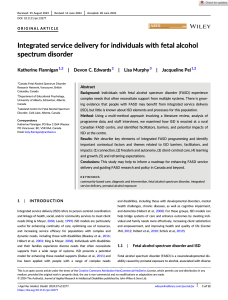
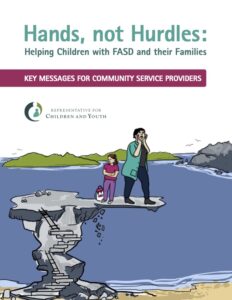
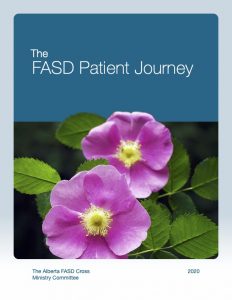
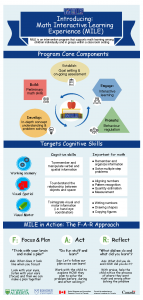

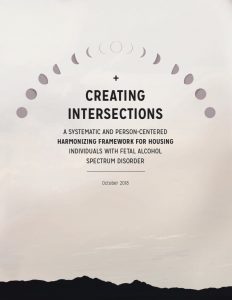
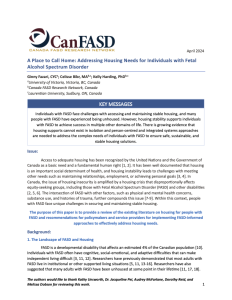
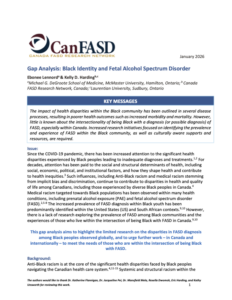
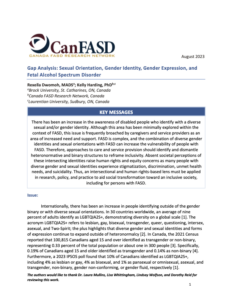
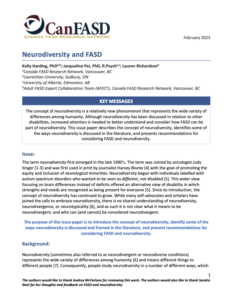
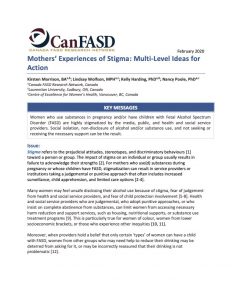
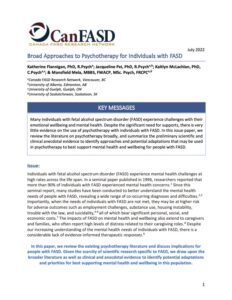
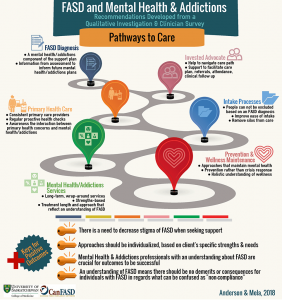
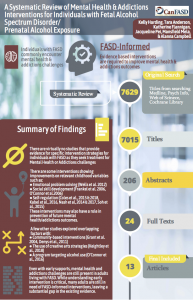
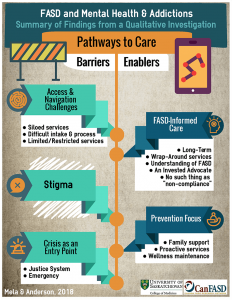
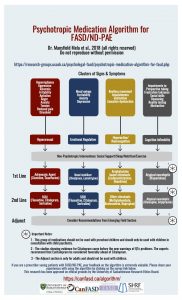
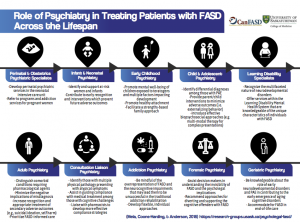
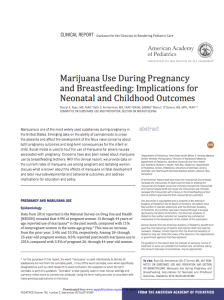
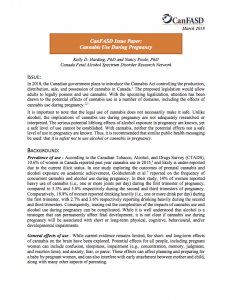

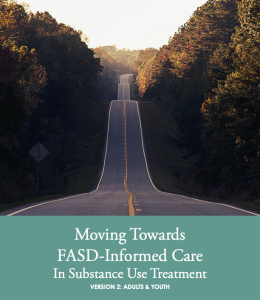
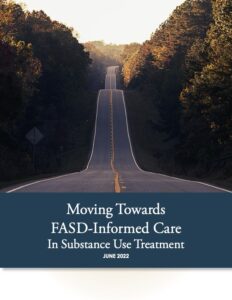

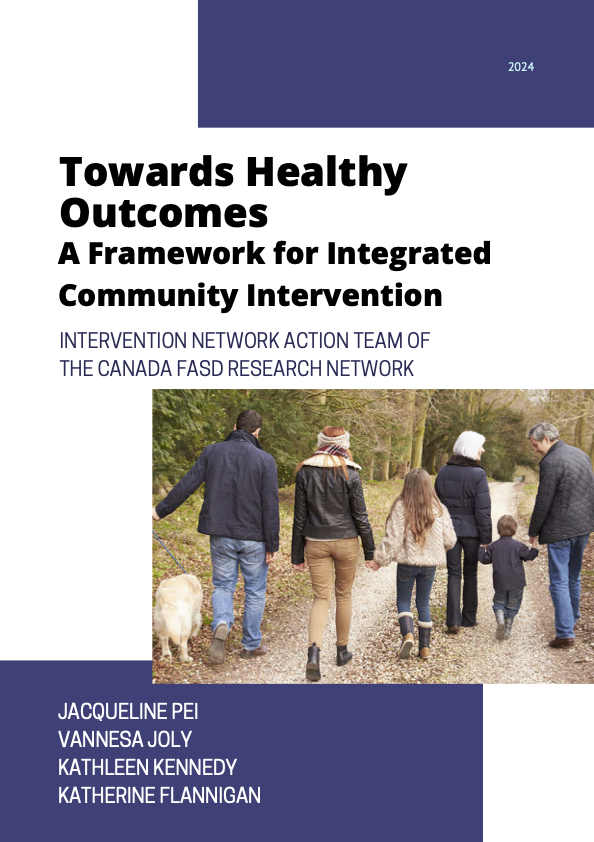
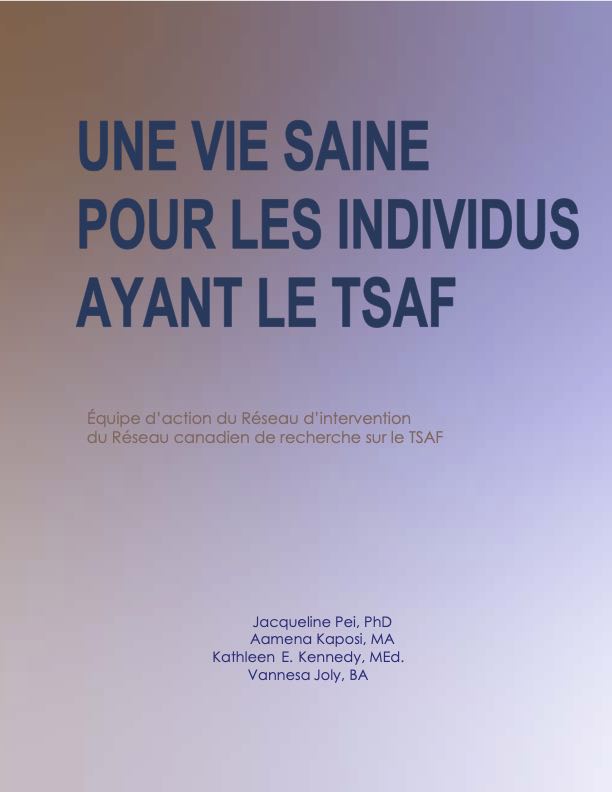
Social Functioning
Male Partner Violence Against Women with Cognitive Disabilities — Women with cognitive disabilities experience male partner violence at a higher rate than non-disabled women. They also tend to remain in abusive relationships for longer, due in part to their social isolation and a lack of appropriately adapted services. Many survivors suffer post-traumatic stress and or stress-related health conditions long after the violence has stopped. This Guide, which is based on a review of literature and interviews with five experienced practitioners, offers some general guidance for community outreach workers supporting women with cognitive disabilities after the initial crisis of ending an abusive relationship.
Fetal Alcohol Spectrum Disorder and Sexually Inappropriate Behaviors: A Call on Sex Offender Treatment Clinicians to Become Informed. Fetal Alcohol Spectrum Disorder resulting from prenatal alcohol exposure is a permanent condition that can include a range of adaptive, cognitive, social, and physical impairments. Not only can symptoms have a deleterious impact on global functioning, but can increase the likelihood of entanglement in the criminal justice system. This can sometimes involve behaviors associated with sexual misconduct. This article provides a brief overview of Fetal Alcohol Spectrum Disorder, the relationship between the disorder and inappropriate sexual behavior, treatment of this population, and areas for future research.
Unprepared: An Appeal for Sex Education Training for Support Workers of Adults with Developmental Disabilities — The sexuality of adults with developmental disabilities (DDs) is a topic seldom addressed, even by those who are charged with their care. The importance of acknowl- edging that these individuals have the right to express sexual desires and be given com- prehensive sex education is paramount for both their physical and mental health. This qualitative study involved presenting a series of open-ended questions to individuals currently or previously employed as support workers. These questions concerned the training and knowledge of these support workers regarding the sexuality of adults with DDs, and the policies relating to such issues in the institutions in which they work. Results reflect the lack of experience that support workers have as well as their lack of confidence in dealing with their clients when issues concerning sexuality arise.
Persons with FASD: Disability and Sexuality — Sexuality is an essential component of human beings that may be difficult for some people with disabilities to express in satisfying ways. A disability that is often overlooked, partly due to the fact that The Diagnostic and Statistical Manual of Mental Disorders (DSM-V) does not list it as a clinical disorder, is Fetal Alcohol Spectrum Disorder (FASD). Although Lemoine, Harousseau, Borteyrun, and Menuet first identified Fetal Alcohol Syndrome (FAS) in 1968, it is now recognized to be part of a greater Fetal Alcohol Spectrum Disorder (FASD), which refers to a range of effects that can occur in an individual whose mother consumed alcohol during pregnancy (Ryan, 2006, p. 1). These effects can be physical, mental, behavioural, and cognitive (Pelech, Badry, & Daoust, 2013, p. 121). The most common traits that are present in all children with FASD are cognitive confusion, learning and memory impairment, as well as the inability to understand the consequences of their actions (Blackburn, Carpenter, & Egerton, 2009, p. 141). For the purpose of this study adults with FASD and their partners or parents were interviewed to learn of the impacts of the condition of FASD. Their responses to the interview questions identified key areas of concern and needs that are largely not being met. An unexpected finding was the difficulties they have with relationships and sexuality. This article discusses that portion of the results that dealt with disability and sexuality.
Lesbian, Gay, Bisexual, and Transgender Youth with Disabilities: A Meta-Synthesis — This meta-synthesis of empirical and nonempirical literature an- alyzed 24 journal articles and book chapters that addressed the intersection of disability, [homo]sexuality, and gender identity/ expression in P–12 schools, colleges and universities, supported living programs, and other educational and social contexts in Australia, Belgium, Canada, New Zealand, Sweden, the United Kingdom, and the United States. The articles and chapters empha- sized the diversity of lesbian, gay, bisexual, and transgender youth with disabilities—culturally, linguistically, sexually, and in terms of abilities, disabilities, and related service needs—while noting that all (or certainly most) lesbian, gay, bisexual, and transgen- der youth with disabilities possess multiple stigmatized identities as sexual/gender minorities and young people with disabilities.
Experiences of Healthcare Providers of Lesbian, Gay, Bisexual, and Transgender Foster Youth — As a disproportionately overrepresented group in public child welfare, Lesbian, Gay, Bisexual, and Transgender (LGBTQ) foster youth have unique health disparities and needs related to their marginalized identities. This thesis discusses current research related to healthcare providers and their experiences serving LGBTQ foster youth in Washington State. The purpose of this study is to better understand the experiences of healthcare providers working with LGBTQ foster youth to improve their health outcomes. This research is performed through eight semi-structured key informant interviews, which provide a qualitative assessment of the experiences of healthcare providers of the LGBTQ foster youth population of Washington State, as well as these providers’ insight into the intersectional issues of LGBTQ foster youth, including race, transgender and gender nonconforming identities, and homelessness.
Gender Considerations in Addiction: Implications for Treatment — Individuals with substance use disorders (SUD) are heterogeneous, making comprehensive assessment an essential part of treatment planning. Since a variety of pharmacological and psychosocial treatments are available, patient needs and characteristics, as well as substance-specific treatment options must be taken into account. In particular, clinicians should consider patient gender, as well as hormonal and other biological factors, when making treatment recommendations. Women are at greater risk for a variety of medical and psychosocial consequences, and may benefit from pharmacological and/or behavioral therapies that differ from those most beneficial for men. Pregnancy and gender identity also warrant special consideration. It is imperative that clinicians keep informed about new research findings that can guide tailoring of evidence-based treatments for men and women with SUD. Looking ahead, the field of pharmacogenomics offers additional promise for identifying the most effective pharmacotherapies for specific patients with SUD.
Our Relatives Said: A Wise Practices Guide | Voices of Aboriginal Trans People — This manual is about identifying needs faced by Aboriginal Trans-people, honouring their stories and experiences and what they say they need in order to find a more welcoming and supportive place in society.
Issue Papers
FASD and Inappropriate Sexual Behaviour — The occurrence of inappropriate sexual behaviours (ISB) is an adverse life outcome that may be experienced by individuals with FASD. The purpose of this paper is to highlight an overview of the current existing research conducted in this area and offer implications for individuals, families, caregivers, and policy makers.
Resources
FASD and Aggression: From Conceptualization to Clinical Best Practice — In this webinar recording, viewers will learn about the conceptualization of aggressive behaviours and FASD while hearing about new research on clinical best practice using the application of Nonviolent Resistance. Viewers can expect to hear from both researchers in the field and in-body experiences.
The National Consortium on Aggression toward Family / Caregivers in Childhood & Adolescence (AFCCA) — The Consortium exists to increase awareness of AFCCA across Canada, to amplify the voices of youth and their families, and to mobilize knowledge in ways that affects policy, systems, services, research, and professional practice to improve the lives of youth experiencing AFCCA and their families.
Interwoven Connections — Interwoven Connections represents the tapestry of families and relationships formed through adoption, kinship and customary care. They create spaces and experiences where parents and caregivers feel seen and heard. Where they have access to trauma sensitive services and supports at every stage of their journey.
The Center for NVR Therapy and Practice (CNTP) — The Center for NVR Therapy and Practice was founded in 2021 to disseminate NonViolent Resistance Therapy (or Presence Therapy) in the Americas. Their mission is to teach useful NVR knowledge, promote its growth and set standards for its practice.